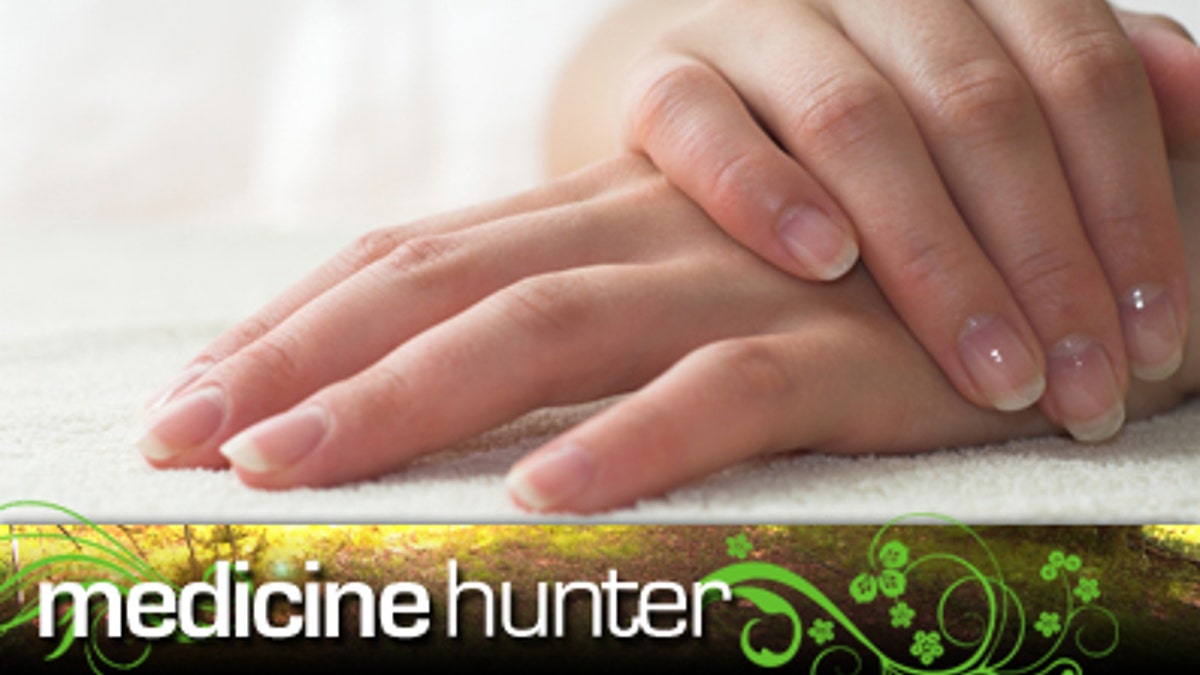
Every few months, someone asks me what can be done for weak, brittle nails. Sometimes the answer is as easy as “get more sun.” Let the sun make vitamin D in your body, and this will often sufficiently strengthen nails. But more often, that is not enough. For the past 20 years, I have been recommending silica derived from horsetail herb (Equisetum arvense) with excellent results. Just two days ago, a woman to whom I had made this recommendation made a point of showing me her nails, which are now strong and healthy. This is one of the simplest remedies I know, and it works fairly quickly, within just a couple of weeks.
Common to Asia, North America and Europe, horsetail derives its name from its characteristic hair-like stems, which resemble the tail of a horse. The stems are the parts used for their rich content of silica, a naturally-occurring component of health skin, hair and nails. The renowned English herbalist Nicolas Culpepper used horsetail to treat wounds, ulcers and skin inflammation, and to stop bleeding. Blackfoot Indians used a poultice of horsetail to treat rashes of the groin and underarm, and the Cherokee drank a tea of horsetail to treat kidney disorders. The Iroquois employed horsetail to relieve headaches, and several other Native American tribes used the plant for kidney disorders, lumbago and for healing wounds of various types.
The mineral content of horsetail averages 10 to 20 percent of dry weight, depending on growing conditions. Of that mineral value, about 65 percent is silicic acids. Both Germany’s Commission E and the British Herbal Compendium recommend horsetail for the treatment of wounds that heal poorly. Additionally, both recommend horsetail for urinary tract and kidney disorders. But without question, the most visible effects of horsetail are seen in fingernails.
The easiest way to use silica is to get an extract of horsetail. I like the Alta Health Silica, which I have recommended for many years. It is easy to find, and relatively inexpensive. One bottle will cost less than an acrylic nail make-over, and is a lot healthier for your fingers. This simple supplement provides a concentration of silica, which is essential for maintaining many types of body tissue.
While silica is an important trace element and is necessary for healthy tissue, we typically don’t get sufficient amounts of it in our diets. You can get silica from asparagus, cabbage, cucumbers, dandelion greens mustard greens, olives, radishes, white onions, corn, bell peppers, soybeans, alfalfa, rice, oats, millet and flax seeds. But even if you eat these foods regularly, you still may not be getting enough silica in your diet to maintain strong nails.
In addition to taking silica supplements such as the only mentioned above you can also drink horsetail herb tea. Alvita Horsetail Grass Tea is a good brand. Drink two or more cups daily, to transform weak nails to real, strong claws. However you consume horsetail herb, you will find that it does make a significant difference in both the appearance and strength of nails. In weeks you will notice a difference. Then, if you have been relying on acrylic nails to cover your own, you can skip that and enjoy what nature gave you.
One side benefit of taking silica supplements or drinking horsetail herb tea is that your hair will also become more healthy and lustrous. Though this takes time, the difference is visible and undeniable. Skin, which is made of collagen (which is mostly silica) will also likely wind up looking better. So if you’ve endured bad nails for a long time, the end is near. Start using natural silica from horsetail herb, and grow the strong, healthy nails you have always wanted.
Chris Kilham is a medicine hunter who researches natural remedies all over the world, from the Amazon to Siberia. He teaches ethnobotany at the University of Massachusetts Amherst, where he is Explorer In Residence. Chris advises herbal, cosmetic and pharmaceutical companies and is a regular guest on radio and TV programs worldwide. His field research is largely sponsored by Naturex of Avignon, France. Read more at www.MedicineHunter.com








































